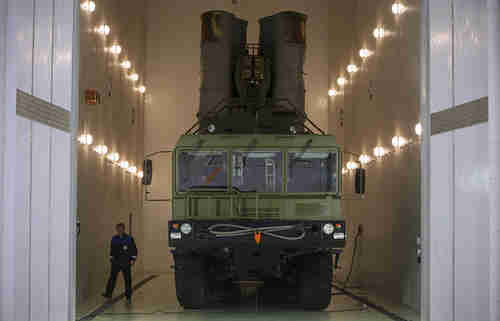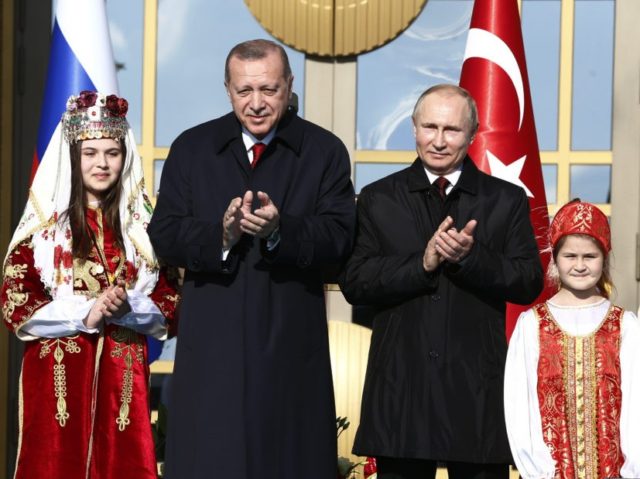This morning’s key headlines from GenerationalDynamics.com
- Russia accelerates delivery of S-400 anti-aircraft missiles to Turkey
- Mainstream media emphasize the love-fest between Turkey and Russia
Russia accelerates delivery of S-400 anti-aircraft missiles to Turkey

Russia’s advanced S-400 anti-aircraft system (Tass)
In the course of a joint press conference by Turkey’s president Recep Tayyip Erdogan and Russia’s president Vladimir Putin, held in Turkey’s capital city Ankara on Tuesday, Erdogan and Putin announced that the previously scheduled delivery of Russia’s advanced S-400 anti-aircraft missiles at the end of 2019 would be moved up.
At the press conference, Putin said:
We have decided with President Erdogan in our meeting to speed up the delivery of the S-400 systems. Our Turkish colleagues made a request in the meetings. We will accelerate the process.
This is an issue of commerce. Companies are working on it.
According to Turkish and Russian media, the S-400 is Russia’s most advanced long-range anti-aircraft missile system with a capacity of carrying three types of missiles capable of destroying targets including aircraft, and ballistic and cruise missiles. The system can track and engage up to 300 targets at a time and has an altitude ceiling of 27 kilometers (17 miles). In addition, the system’s radars detect aerial targets at a distance of up to 600 kilometers (373 miles).
So there are some unanswered questions about this deal:
- What is the intended target of these S-400 missiles? Is Erdogan planning to target American warplanes? Israeli warplanes? Iranian warplanes? Syrian warplanes? Armenian warplanes? Nato warplanes?
- And what’s the rush? Which of these potential targets has become so imminently dangerous that Erdogan needs to accelerate the delivery of the missiles?
In an interview before the press conference, Putin said:
A priority task in the sphere of military technical cooperation is the implementation of the contract for supplies of S-400 Triumf missile systems to Turkey.
We hope that the sectoral intergovernmental commission will look into the prospects for further supplies of Russian-made military hardware to Turkey at its next meeting.
So the obvious question is: Why is Putin so anxious to sell these systems to Turkey?
According to other reports, Russia is delivering the same S-400 systems to China. Whom does Putin think that Turkey and China will be using these anti-aircraft missiles against?
Is Putin really so certain that Turkey and China will not use the S-400 missiles against Russia? Or maybe something deeper is going on – like a secret way for Russia to disable these missiles remotely?
NATO officials are strongly opposed to this deal between Turkey and Russia, because Turkey is member of NATO and so it is important that all weapons systems of all NATO countries be interoperable with each other. However, Russia’s S-400 system is not interoperable with other NATO weapons systems, so deploying S-400 systems represents a sharp rejection by Turkey of its relationship with NATO.
This also provides one more reason why Putin is anxious to deliver S-400 systems to Turkey as quickly as possible – to make sure that Turkey cannot militarily cooperate with NATO. Anadolu (Ankara) and Tass (Moscow) and Hurriyet (Ankara) and Tass
Mainstream media emphasize the love-fest between Turkey and Russia
One media story after another on Tuesday described how Vladimir Putin and Recep Tayyip Erdogan are developing a close personal friendship that is bringing Russia and Turkey closer together, shutting the U.S. out. For example:
Ties between Russia and Turkey are growing closer than ever, as Russia runs into widespread diplomatic fallout from the poisoned spy scandal and Turkey’s relations with its Western allies worsens over human rights issues and its military operations against Kurdish militia in Syria.
The “deepening friendship” between Putin and Erdogan can only be described as bizarre. This is a good time to remind readers that from the point of view of Generational Dynamics, that the behavior of two nations towards each other depends not on the attitudes of the politicians, but on the attitudes of the two populations. And historically, the people of Russia and the people of Turkey hate each other.
During the last millennium, one of the most bloody and vicious relationships in the world was that between the people who have become today’s Turks and Russians. As I described in November 2015, when Turkey shot down a Russian warplane and brought the two countries close to military conflict, the Crimean Peninsula was the site of several generational crisis wars between the two.
The Tatars were a tribe of Mongols who, under the leadership of Genghis Kahn, defeated China, then Russia, where they occupied Crimea. In 1571, the Crimean Tatars attacked and sacked Moscow. In 1783, Russia under Catherine the Great annexed Crimea in a war in which the Ottomans (Turkey) were defeated. The Crimean War (1853-55) was a disaster for both the Russians and the Turks, though more so for the Russians, who lost Crimea and other territories on the Black Sea. World War I saw the destruction of Russia’s Tsarist empire and Turkey’s Ottoman Empire.
So it is particularly significant today that Russia has invaded and annexed Crimea, and has treated the current Tatar population brutally. The Tatars are historically close to the Turks, and although we do not read much about this in the media, the Russian treatment of Tatars must infuriate many Turks.
It is quite a reasonable question to ask what is going on here, when these two politicians, Putin and Erdogan, are behaving in ways that must upset many of the people they represent.
In the past, I have described the reasons why China and Russia, whose populations also respectively hate each other, are allying – because both countries are supporting each other in annexing other countries’ territories, as Hitler did prior to World War II. Russia and China need each other because they need each other’s support, in the sense of “honor among thieves.”
Putin and Erdogan have also reached the conclusion that Russia and Turkey need each other, for several reasons:
- Turkey’s military operation in Afrin, Syria, is only possible because Russia is permitting it, as Russia controls the airspace.
- Turkey has given its blessing for Russian bases in Syria and is no longer insisting that hated Syrian President Bashar al-Assad must step down.
- Turkey has refused to go along with the accusations by the UK, the EU, and the United States that Russia is responsible for the recent nerve gas poisoning of a former Russia agent on British soil.
- Turkey is a transit country for Russian natural gas shipments to Europe.
In addition, on Tuesday, Putin and Erdogan broke ground on a $20 billion Russian-made nuclear power plant being built on Turkey’s Mediterranean coast at Akkuyu. The project was already launched once before in February 2015, but was canceled after Turkey shot down the Russian warplane. Putin said on Tuesday, “This scale of the project is difficult to exaggerate. This marks a new stage in the development of Turkey’s economy.”
This “marriage of convenience” between Putin and Erdogan cannot last, in view of the centuries of bitter, bloody conflict between the two countries. At some point, Russia will be forced to choose between the West versus China and Turkey, and they will choose the West.
Generational Dynamics predicts that the approaching Clash of Civilizations world war will pit China, Pakistan and the Sunni Muslim countries against the US, India, Russia, and Iran. In the Mideast, Generational Dynamics predicts a full-scale Mideast war, pitting Jews against Arabs, Sunnis against Shias, and various ethnic groups against each other. AP and Daily Mail and AFP and RFE/RL
Related Articles
- Turkey shoots down Russian warplane, evoking memories of many Crimean wars (25-Nov-2015)
- Tense Turkey-EU summit in Bulgaria once again ends in failure (28-Mar-2018)
- Turkey achieves victory in Afrin, Syria, but Kurds threaten guerilla war (20-Mar-2018)
- Syrian war escalates sharply, after Israel, Iran, Turkey and Russia all lose aircraft (11-Feb-2018)
- Turkey, Russia and Syria infuriated by the Border Security Force announcement (16-Jan-2018)
KEYS: Generational Dynamics, Russia, Vladimir Putin, S-400 anti-aircraft system, Turkey, Recep Tayyip Erdogan, Syria, Bashar al-Assad, Afrin, Crimea, Crimean Tatars, Catherine the Great, Crimean War, Ottoman Empire, Akkuyu
Permanent web link to this article
Receive daily World View columns by e-mail

COMMENTS
Please let us know if you're having issues with commenting.